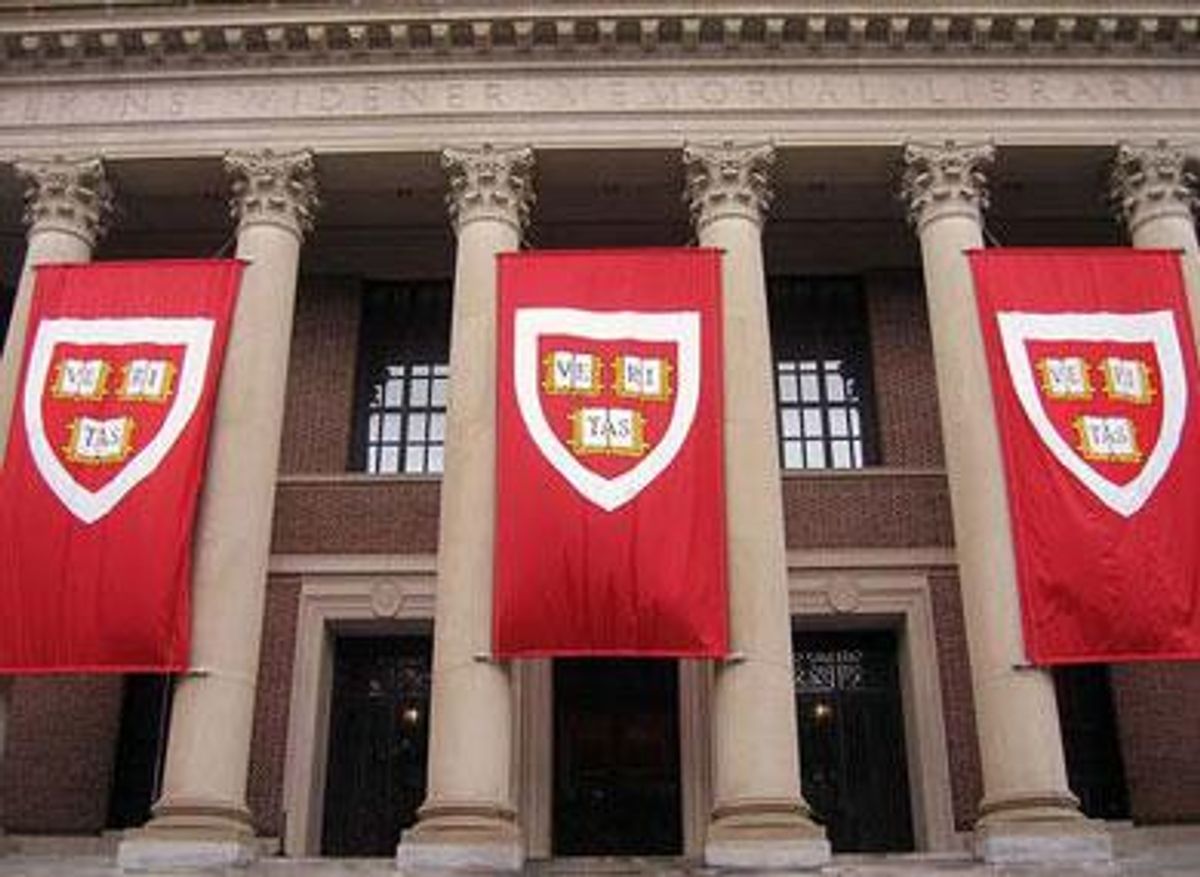The F.O. Matthiessen Visiting Professorship of Gender and Sexuality -- believed to be the first endowed, named chair in LGBT studies at an American university -- brings a tinge of pink to the ivory tower.
In 1920, as was not uncommon for American institutions at the time, Harvard leaders convened a secret tribunal to interrogate university members suspected of being gay. A total of 14 men were found "guilty" of homosexuality, including eight students, who were expelled. One of them committed suicide upon receiving the judgment, just days before he was to graduate.
Almost 90 years later, after a whirlwind century of advances for LGBT people, members of the Harvard Gay and Lesbian Caucus have helped the university establish what they believe to be the first endowed, named chair in LGBT studies at an American institution of higher learning. The F.O. Matthiessen Visiting Professorship of Gender and Sexuality, named for a gay Harvard scholar from the mid-20th century, will be formally announced on Thursday at the annual dinner of the caucus on commencement day. Evelyn Hammond, the dean of Harvard College -- and the first woman, openly gay person, and African-American to serve in the role -- will attend to accept the honor of behalf of the university.
Leaders of the gay and lesbian caucus, who were instrumental in raising the $1.5 million for the endowed chair over the past 18 months, say it represents not only an achievement for Harvard but also a significant measure of progress for the LGBT population at large.
"What makes Harvard important is that it is the biggest brand name in higher education," says Kevin Jennings, a member of the board of directors of the Harvard Alumni Association, who also cochaired the fund-raising effort. "It's a very important moment when Harvard endows a chair. It says, 'This is a legitimate field of study and it will be permanent in our curriculum.'"
The first person to hold the Matthiessen has not yet been selected. Beginning in fall 2011 a leading thinker from any possible number of disciplines will be nominated by a committee in the school's Faculty of Arts and Sciences. Once chosen, the individual will stay for no longer than two semesters, followed by a new occupant. The goal is to expose students to many different perspectives, and to promote frequent scholarly exchange in the burgeoning, interdisciplinary field of LGBT studies.
"It's a way to grow the field," says Tom Parry, the immediate past president of the Harvard Gay and Lesbian Caucus. "When Harvard makes a statement, even though it may be coming late to the game, people listen."
Jennings and Parry readily admit that Harvard, while considered by many to be the world's preeminent university, takes a conservative approach when it comes to embracing cutting-edge scholarship. The university did not formally establish a major in LGBT studies until 2003. By contrast, the country's first gay and lesbian studies program was founded in 1986 at the City University of New York by Martin Duberman, a Harvard graduate.
Still, the caucus says that the chair's being named for someone and devoted to LGBT studies is a first.
"What makes this unique is that this is an endowed chair in LGBT studies," says Jennings. "That's never been done before that we know of."
The suggestion to name the chair for Francis Otto Matthiessen came from Warren Goldfarb, a philosophy professor and founding member of the gay and lesbian caucus in 1984, says Parry. Prior to a wave of faculty comings-out in the early 1990s, Goldfarb was one of a handful of openly gay professors in the decades following Matthiessen, if not the only one.
"Matthiessen lived about as openly as you could for the time," says Parry, noting that the professor and his partner of two decades, Russell Cheney, entertained university guests in their home. "He was a socialist, very progressive, and a women's rights advocate."
His politics brought scrutiny from the House Committee on Un-American Activities, which some say combined with anguish over the death of Cheney in 1945 to lead Matthiessen to commit suicide in 1950.
One key intention of the new chair is to present Matthiessen's life honestly.
"It reclaims an important person's academic history and says, 'This was a gay man,'" says Jennings.
Now close to 5,000 strong as it celebrates its 25th anniversary, the Harvard Gay and Lesbian Caucus thrives in a campus and cultural climate vastly more accepting than the one Matthiessen knew. Two years ago, the Faculty of Arts and Sciences unanimously approved the caucus's proposal for the chair, and university president Drew Gilpin Faust, the first woman to lead Harvard, has hailed it as "an important milestone."
"It wasn't at all controversial," says Parry of the process to establish the chair. "It was probably more bureaucratic than anything else."
One area that did present a challenge was fund-raising, particularly for a somewhat novel cause in the midst of an economic downturn. Reports indicate that Harvard's $37 billion endowment, the largest of any university, shrunk by 30 percent this year.
"Usually, when you are raising money for an endowed chair, you find somebody in their 70s or 80s and you say, 'Write me a check,'" says Jennings. "In this case, people of that age were not out, or many others who would have been that age had died of AIDS."
In a collective effort, close to 200 caucus members made contributions on average "in the low four figures" to raise the $1.5 million needed to create the chair.
"The people who gave understood how important it was," Jennings says, noting that for many donors, it was their first gift to Harvard or their largest gift to date.
"This is our community's achievement," he says.


















































































